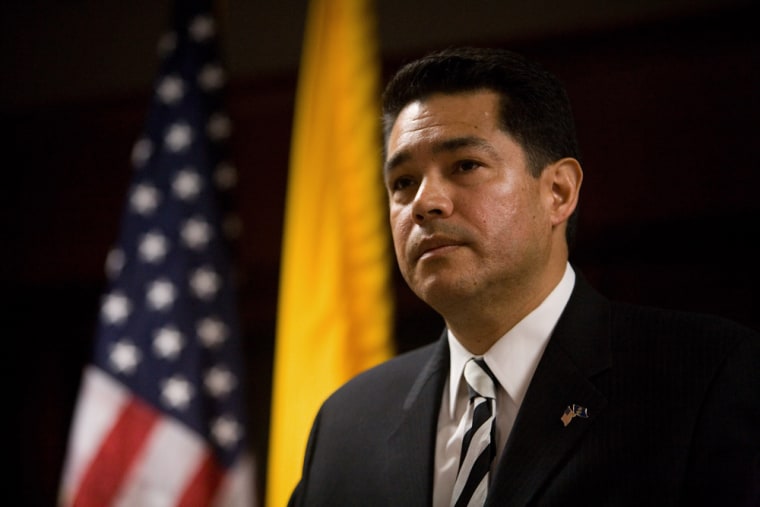Democrats are moving to compel some of the eight U.S. attorneys who have been ousted to tell their stories publicly, under oath, after a federal prosecutor claimed he was fired for political reasons.
A House subcommittee is slated to vote Thursday on subpoenas for four of the eight dismissed U.S. attorneys. The Senate Judiciary Committee, meanwhile, will send letters to those fired before voting next week on compelling their testimony, according to officials with both panels.
The prosecutors have privately told both committees that they would not testify voluntarily but would honor a congressional subpoena, according to Sen. Charles Schumer, D-N.Y., and an official close to the House subcommittee on commercial and administrative law.
U.S. attorney positions 'too important to be politicized'
House subcommittee Chairwoman Linda Sanchez said her panel will vote on subpoenas for fired prosecutors Carol Lam of California, David Iglesias of New Mexico, H.E. "Bud" Cummins of Arkansas and John McKay of Washington.
"In order to get the full picture of why these U.S. attorneys were fired, we need to hear from the Justice Department and the U.S. attorneys themselves," said House Judiciary Committee Chairman John Conyers, D-Mich.
Schumer, in a telephone interview Wednesday with The Associated Press, said: "If they say they won't come voluntarily, Senator Leahy will authorize subpoenas." The Senate panel is expected to vote on whether to issue the subpoenas next week, said Tracy Schmaler, spokeswoman for Chairman Patrick Leahy, D-Vt.
Senate Majority Leader Harry Reid, D-Nev., said the positions are "too important to be politicized." One of the dismissed U.S. attorneys is from Reid's home state.
Federal prosecutors serve 'at the pleasure of the president'
Spurring the developments was a new report that one of the eight, New Mexico's David Iglesias, claims to have been forced out after refusing a request by two congressmen to rush an indictment that might have helped Republicans in the 2006 election. In the story and a subsequent interview with the AP, Iglesias refused to identify the members of Congress.
The Justice Department staunchly denied the charge that Iglesias or any of the eight federal prosecutors were dismissed for political reasons.
"The suggestion that David Iglesias was asked to resign because he failed to bring an indictment ... is flatly false," Justice Department spokesman Brian Roehrkasse said in a statement. "This administration has never removed a United States attorney in an effort to retaliate against them or inappropriately interfere with a public integrity investigation."
As to why Iglesias was dismissed, Roehrkasse said: "We made our decision not to further extend his service based on performance-related concerns."
Federal prosecutors serve at the pleasure of the president and can be fired for any reason — or none at all.
But Democrats say the eight firings — some without cause, according to the Justice Department — indicate the Bush administration is using a new provision in the Patriot Act to reward political allies with coveted jobs as U.S. attorneys.
Congressional pressure
The new provision, enacted a year ago with the reauthorization of the Patriot Act, removes a time limit within which appointees to such posts must be confirmed by the Senate. Democrats say that's a Bush administration effort to get around the confirmation process.
Attorney General Alberto Gonzales has said he intends to submit the name of every nominee to vacant U.S. attorney posts to the Senate for confirmation.
Still, Democrats tried to revive a bill Wednesday that would reimpose the time limit. An objection by Sen. Jon Kyl, R-Ariz., killed the measure. On Wednesday, its sponsor, Sen. Dianne Feinstein, D-Calif., tried to attach it as an amendment to an omnibus bill to tighten the nation's homeland security. Kyl was again expected to block the measure, his spokesman said.
The Justice Department says a 120-day limit isn't enough time for an appointee to be recommended by home-state senators, nominated and confirmed.
But raising the issue on the Senate floor allowed Feinstein to read a news story into the record that fueled the matter anew Wednesday.
‘Episode came like a thief in the night’
In Wednesday's editions, McClatchy Newspapers quoted Iglesias as claiming that two members of Congress contacted him in the weeks before the 2006 election to ask about an investigation of a kickback scheme. He said the members, whom he refused to identify, appeared eager to see an indictment just before the elections.
Corruption charges against two previous state New Mexico treasurers — both Democrats — became an issue during the election; further charges could have helped the Republicans. Iglesias, a Republican, refused to name the members of Congress in the report because he feared retaliation, according to McClatchy Newspapers. Contacted by the AP, Iglesias said: "I've got nothing further to say about that."
The Justice Department's Roeherkasse said that the U.S. Attorneys Manual calls on federal prosecutors to notify the agency of any calls from members of Congress.
"We are unaware that anyone in Main Justice (department headquarters) was notified of any conversations between U.S. Attorney Iglesias and members of the New Mexico Congressional delegation," Roehrkasse said.
Earlier Wednesday, Iglesias' last day on the job, he told reporters at a news conference in Albuquerque, N.M., that the Bush administration's call for his resignation came without warning and was rooted in politics — not performance.
"This episode came like a thief in the night," he said of the Dec. 7 request for him to step down. He added, "Obviously, I tripped some wire."
